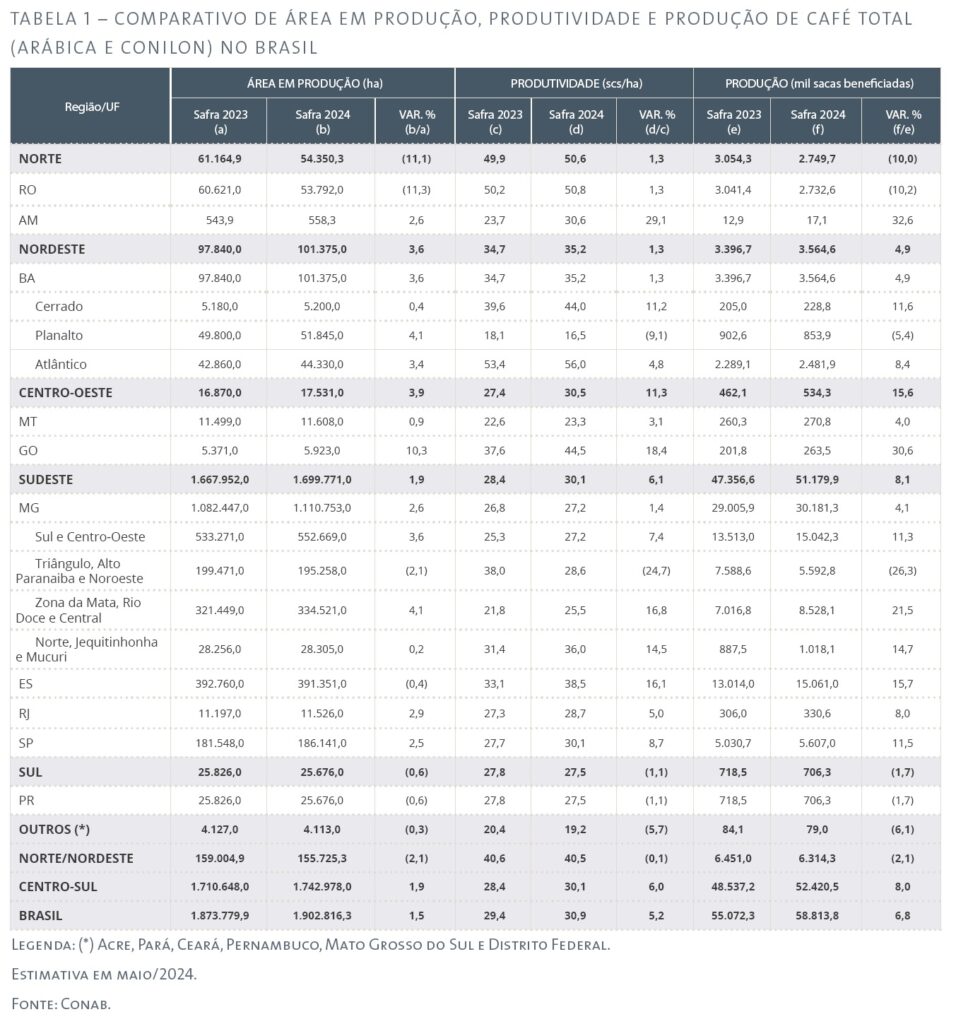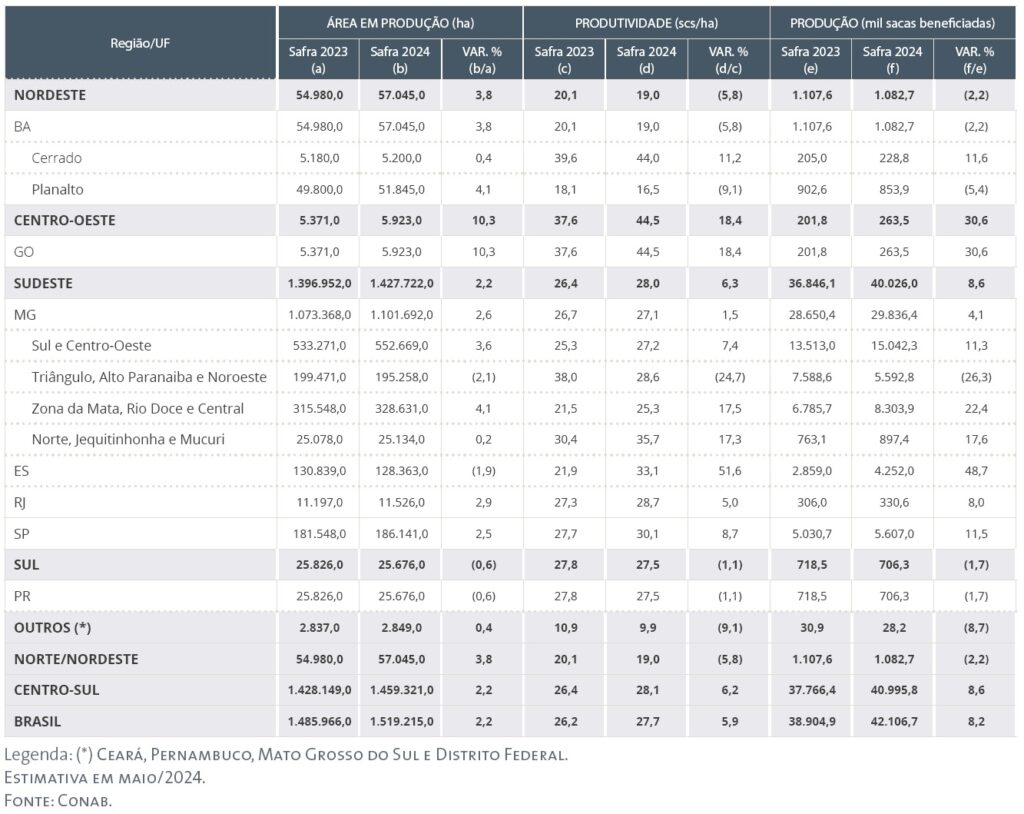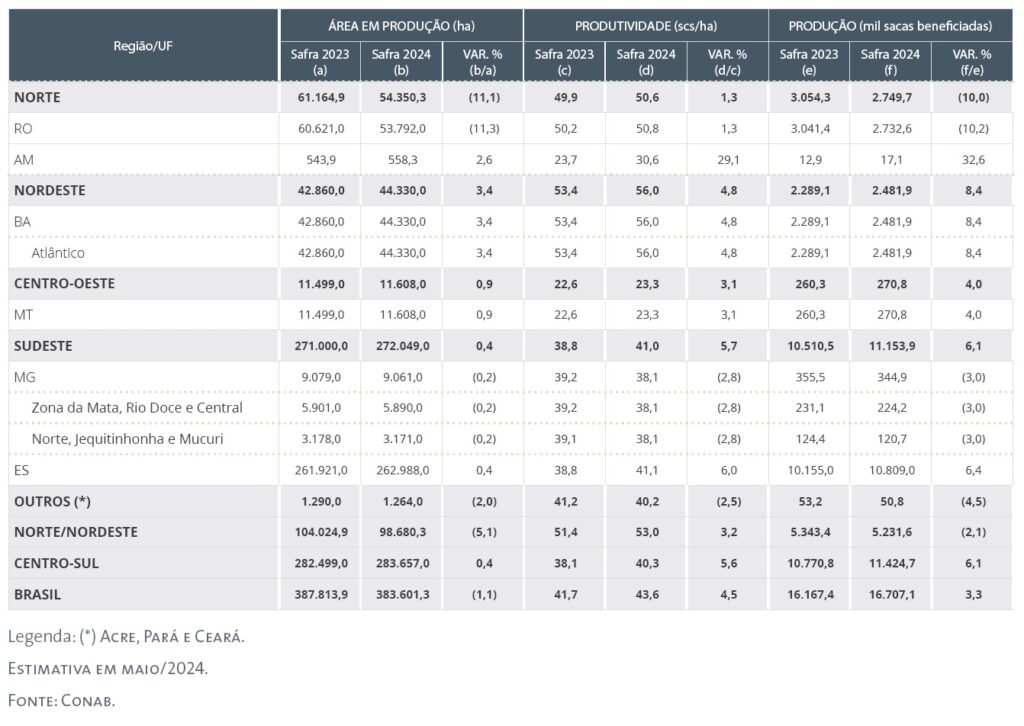MILAN – Coffee production prospects are improving in Brazil, but the Robusta harvest may turn out to be lower than initially expected: Conab presented yesterday morning (23 May) the results of its second official estimate for the 2024/25 crop, which started in March and will end in September.
Conab, Brazil’s National Supply Company, is the government agency responsible for providing information on the country’s agricultural harvest.
Coffee production is now estimated at 58.81 million bags. This is an increase 800,000 bags relative to the first estimate released in January (click on the tables to enlarge them).
 The Arabica forecast is revised upwards by almost 1.4 million bags, whereas the Robusta forecast is cut down by about 600 thousand bags.
The Arabica forecast is revised upwards by almost 1.4 million bags, whereas the Robusta forecast is cut down by about 600 thousand bags.
As already mentioned, overall production is now estimated at 58.81 million bags: 6.8% more than in 2023 and 15.5% more than the previous on-year year of 2022, which was, however, negatively affected by the climatic events of the previous seasons.
 Arabica production is pegged by Conab at 42.1 million bags, or 8.2% more than a year ago. Productivity will reach 27.7 bags/ha, up by 5.9%.
Arabica production is pegged by Conab at 42.1 million bags, or 8.2% more than a year ago. Productivity will reach 27.7 bags/ha, up by 5.9%.
The area in production amounts to 1.52 million hectares, a slight increase (+2.2%) over the previous year.
The Robusta crop will rise to 16.71 million bags, up 3.3% from the previous crop year. Productivity will reach 43.6 bags/ha, an increase of 4.5%. The area in production will be slightly smaller (-1.1%), at 383,600 hectares.
 Production in Minas Gerais is seen up by 4.1%, to 30.2 million bags, due to a 1.4% increase in productivity, to 27.2 bags/ha, and an expansion of the area in production of 2.6%, to 1.11 million hectares.
Production in Minas Gerais is seen up by 4.1%, to 30.2 million bags, due to a 1.4% increase in productivity, to 27.2 bags/ha, and an expansion of the area in production of 2.6%, to 1.11 million hectares.
Production will increase in all mesoregions, with the exception of Triângulo, Alto Paranaiba and Noroeste, where the two-year cycle is reversed compared to the rest of the state.
A double digit increase is expected in Espírito Santo, with production reaching 15.1 million bags, up 15.7% from last year. The Robusta crop, of which this state is Brazil’s largest producer, will total 10.81 million, up 6.4%. Productivity will stand at 41.1 bags/ha (+6%).
Arabica production is expected to soar to 4.25 million bags (+48.7%), due to the recurrence of an on-year in the two-year cycle characteristic of Arabica coffee production, the effects of which are particularly marked in this state.
The overall positive weather conditions, with well-distributed rainfall, which mitigated the impact of the drought in mid-November, will also trigger a recovery in production in São Paulo, where the harvest will rise to 5.61 million (+11.5%). Productivity will exceed 30 bags/ha, up, in turn, by 8.7%.
Bahia will produce 3.56 million bags (+4.9%). Arabica production will decrease to 1.1 million (-2.2%). The Robusta crop, on the other hand, is expected to reach 2.48 million bags (+8.4%), thanks to the expansion of the areas in production (+3.4%) and a further increase in productivity (+4.8%), which will reach 56 bags/ha.
Rondônia, Brazil’s second largest producer of Robusta, will suffer a 10.2% drop to 2.7 million, due to crop renewal in some area, whereas productivity will further increase (+1.3%) to 50.8 bags/ha.
Finally, production in Paraná is slightly down (-1.7%), at just 706,300 bags, in what was once Brazil’s top producing state.










